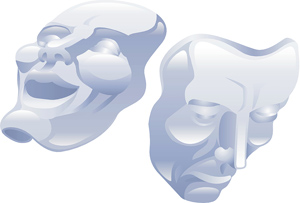Bipolar Disorder
Bipolar disorder is also known as known as manic depression, bipolar affective disorder or bipolar depression. The condition affects your moods which can vary from one extreme to the other. Bipolar sufferers will (usually) have periods of depression and periods of mania.
Depression and mania
 Periods of depression and mania that are associated with bipolar manifest themselves in the following ways:
Periods of depression and mania that are associated with bipolar manifest themselves in the following ways:
- Depression: where you feel very low, other symptoms associated with depression can be found here.
- Mania: where you feel very high; feelings of elation, you may become easily distracted. Behaviours may include; an increased sexual appetite, over spending, you may behave more recklessly. Slightly less severe mania is known as hypomania.
You are also likely to experience periods of normal mood between these times of mania and depression.
Unlike simple mood swings, each extreme period of bipolar disorder has other associated symptoms. Each extreme episode of bipolar disorder can last for several weeks or longer and the high and low periods of illness can be so extreme that they interfere with everyday life.
Usually the depression phase of bipolar disorder comes first. Initially clinical depression is diagnosed before having a manic episode which may come years later after which the diagnosis might change. During a depressive phase you may have overwhelming feelings of worthlessness whereas during a manic phase you may you may feel very happy and have lots of ambitions and plans.
How common is bipolar disorder?
Bipolar disorder can occur at any age, although it often develops in people who are between 18-24 years of age. Both men and women, and people from all backgrounds, can develop bipolar disorder.
Bipolar disorder is a relatively common condition with around one person in 100 being diagnosed with the condition.
Treatment
Treatment for Bi-Polar Disorder will nearly always be continuous and on-going. Bi-Polar is condition that will require the right help and support for the individual sufferer. This will commonly include medication and psychological therapy.
It is important that the sufferer has the right support medically and socially to help manage this condition. It is possible to live a normal and happy life with this disorder, but it is very important to seek help if you or someone you know is suffering from symptoms associated with it.
For more information
Please see our whole Bipolar section with more indepth resources
We can also offer a FREE bipolar book written by experts





